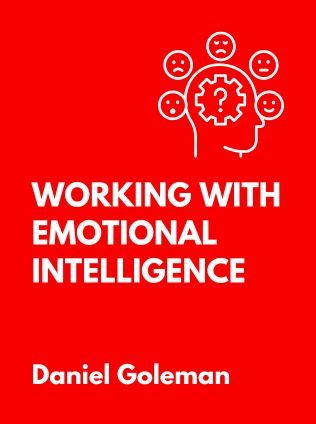
Working With Emotional Intelligence
By Daniel Goleman
Published 01/2000
About the Author
Daniel Goleman is an influential psychologist and author renowned for his pioneering work in the field of emotional intelligence. He holds a Ph.D. from Harvard University and spent 12 years reporting on the brain and behavioral sciences for The New York Times. Goleman has authored several seminal works, including the best-sellers "Emotional Intelligence" and "Social Intelligence." His extensive research and writings have fundamentally reshaped our understanding of human competencies and their role in personal and professional success.
Main Idea
In "Working with Emotional Intelligence," Daniel Goleman explores the crucial role of emotional intelligence (EI) in achieving success in the workplace. He argues that traditional measures of intelligence, such as IQ and technical skills, are no longer the primary indicators of professional success. Instead, Goleman presents emotional intelligence as a set of competencies that are essential for effective leadership, teamwork, and overall job performance. Through comprehensive research and real-world examples, Goleman demonstrates how emotional intelligence can be developed and harnessed to enhance personal and organizational effectiveness.
Table of Contents
- The New Yardstick
- Competencies of the Stars
- The Emotional Competence Framework
- The Hard Case for Soft Skills
- The Inner Rudder
- Self-Control
- What Moves Us
- People Skills
- The Arts of Influence
- Collaboration, Teams, and the Group IQ
- A New Model of Learning
- The Emotionally Intelligent Organization
- Some Final Thoughts
The New Yardstick
The landscape of work is evolving, and the criteria by which we are judged are shifting. Goleman posits that emotional intelligence has become the new yardstick for professional success. Unlike traditional metrics that emphasize intellectual prowess or technical skills, this new standard focuses on how well individuals manage themselves and their relationships with others. Emotional intelligence encompasses personal qualities such as initiative, empathy, adaptability, and persuasiveness, which are crucial for distinguishing star performers from the mediocre.
"The rules for work are changing. We're being judged by a new yardstick: not just by how smart we are or by our training and expertise, but also by how well we handle ourselves and each other." - Daniel Goleman
Goleman emphasizes that these qualities are not innate but can be developed and refined. He suggests that organizations that prioritize emotional intelligence in their culture and hiring practices are more likely to thrive in today's competitive marketplace.
Competencies of the Stars
Emotional intelligence skills are synergistic with cognitive abilities; top performers exhibit both. Goleman identifies a range of emotional competencies that distinguish star performers from average ones. These include self-awareness, self-regulation, motivation, empathy, and social skills. Each of these competencies contributes to a person's ability to excel in complex job roles, where purely cognitive skills may not suffice.
"Emotional competence made the crucial difference between mediocre leaders and the best. On average, close to 90 percent of their success in leadership was attributable to emotional intelligence." - Daniel Goleman
Goleman illustrates this with the example of an executive who, despite having high cognitive complexity, struggled with emotional triggers. This executive's inability to confront poor performance in subordinates highlighted how emotional deficiencies could undermine intellectual capabilities.
Sign up for FREE and get access to 1,400+ books summaries.
You May Also Like
The Subtle Art of Not Giving a F*ck
A Counterintuitive Approach to Living a Good Life
By Mark MansonRich Dad Poor Dad
What the Rich Teach Their Kids About Money - That the Poor and Middle Class Do Not!
By Robert T. KiyosakiHow To Win Friends and Influence People
The All-Time Classic Manual Of People Skills
By Dale CarnegieQuiet: The Power of Introverts
The Power of Introverts in a World That Can't Stop Talking
By Susan Cain



















